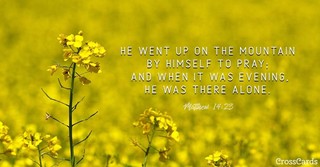
- Recent Translations
- All Translations
Matthew 14:13
Share
Settings
The Feeding of Five Thousand
13 Now [when] Jesus heard [it], he withdrew from there in a boat to an isolated place by himself. And [when] the crowds heard [it], they followed him by land from the towns.Images for Matthew 14:13

Matthew 14:13 Meaning and Commentary
When Jesus heard of it
Of the death of John, and of the cruel usage he had met with; and particularly, that his fame had reached the court of Herod, and that he was talked of there, and said by Herod himself to be John the Baptist, that was risen from the dead;
he departed thence by ship, into a desert place apart;
to avoid Herod, though not through fear of death; but because his time was not yet come: which may teach us, that it is lawful to shun dangers, when there is an opportunity; which may be done, without betraying truth, or sacrificing a good conscience. The other evangelists, Mark and Luke, assign another reason of this departure of Christ's, that it was upon the return of his disciples to him from their embassy; when having given him an account of what they had done, and taught, he judged it proper they should retire, and get some refreshment and rest; and both may very well be thought to be the reasons of this recess. At the same time that John's disciples brought him the news of their master's death, Christ's disciples return to him, with the account of the success of their ministry; who might not only be weary, and want refreshment, but be discouraged in their minds, at this instance of cruelty; wherefore Christ thought it necessary to retire, partly for his own safety, and partly for their ease; and that he might have an opportunity of fortifying their minds against all trials and persecutions they were to meet with: the place from whence he departed, was either Capernaum, his own country and city, or Nazareth, where we have lately heard of him; or some other place in Galilee, where he was, when John's disciples came to him: the place whither he went, was "a desert place"; and, as Luke says, "belonging to the city called Bethsaida", the city of Andrew and Peter, which lay on the other side of the sea of Galilee, or Tiberias; over which he went by ship, ( John 6:1 ) .
And when the people had heard thereof;
of his departure, and whither he went,
they followed him on foot out of their cities;
such as Nazareth, Capernaum, Tiberias, and others; and passing the bridge at Jordan, as Dr. Lightfoot observes, they outwent the ship, and got thither before them, as Mark relates. This showed their great affection and zeal for Christ, and their diligence in attending on him.
Matthew 14:13 In-Context
Footnotes 4
- [a] *Here "[when]" is supplied as a component of the participle ("heard") which is understood as temporal
- [b] *Here the direct object is supplied from context in the English translation
- [c] *Here "[when]" is supplied as a component of the participle ("heard") which is understood as temporal
- [d] *Here the direct object is supplied from context in the English translation